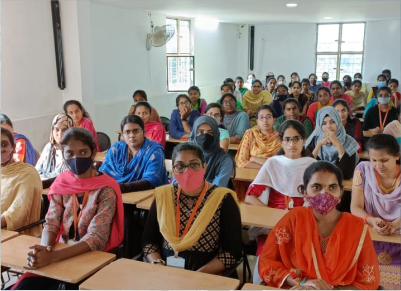B.Sc Honors in Biotechnology
| Details | Description |
|---|---|
| Objectives | The Bachelor of Science Honors in Biotechnology program aims to provide students with a comprehensive understanding of the principles, techniques, and applications of biotechnology in various domains of life sciences. The program is designed to foster critical thinking, laboratory skills, and an in-depth understanding of genetic engineering, molecular biology, bioinformatics, and other cutting-edge biotechnological advancements. |
| Eligibility | Eligibility criteria for the B.Sc. Honors in Biotechnology typically include completion of Intermediate / XII or equivalent education with a strong background in biology and chemistry. |
| Programme Outcomes | Upon successful completion of the B.Sc. Honors in Biotechnology program, graduates will have achieved a range of outcomes that prepare them for both further education and careers in the biotechnology sector. These outcomes include: In-depth Knowledge: Graduates will possess a solid foundation in biological sciences and an in-depth understanding of various biotechnological processes, including genetic engineering, molecular diagnostics, and industrial biotechnology. Laboratory Skills: Students will have gained hands-on experience in laboratory techniques, data analysis, and experimental design, equipping them with practical skills essential for research and development in biotechnology. Critical Thinking: The program emphasizes critical thinking and problem-solving abilities, enabling graduates to analyze complex biological issues and propose innovative solutions. Interdisciplinary Approach: Students will develop interdisciplinary skills by integrating biology, chemistry, and computational techniques, allowing them to tackle multifaceted challenges in the field. Ethical Awareness: Graduates will understand the ethical, social, and environmental implications of biotechnological advancements, fostering responsible scientific conduct. |
| Employment Opportunities | A B.Sc. Honors in Biotechnology opens doors to a wide array of career opportunities in various sectors, including: Research and Development: Graduates can work in research laboratories, contributing to advancements in fields like pharmaceuticals, agriculture, and healthcare through innovative biotechnological solutions. Biopharmaceutical Industry: Opportunities exist in drug development, production, and quality control, where biotechnological techniques play a pivotal role. Bioinformatics: With skills in data analysis and computational biology, graduates can excel in handling and interpreting large biological datasets. Agricultural Biotechnology: Graduates can contribute to enhancing crop yields, developing genetically modified organisms (GMOs), and improving agricultural sustainability. Environmental Biotechnology: This sector addresses environmental challenges through bioremediation, waste management, and sustainable resource utilization. Medical and Healthcare Sector: Graduates can contribute to molecular diagnostics, personalized medicine, and regenerative therapies. Entrepreneurship: Armed with knowledge of biotechnology, graduates can establish their own biotech startups, creating innovative products and solutions |


